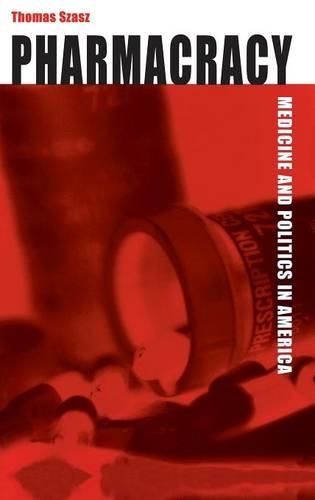
Pharmacracy: Medicine and Politics in America
(Hardback)
Publishing Details
Pharmacracy: Medicine and Politics in America
By (Author) Thomas Szasz
Bloomsbury Publishing PLC
Praeger Publishers Inc
30th April 2001
United States
Classifications
Tertiary Education
Non Fiction
Health systems and services
362.10973
Physical Properties
Hardback
240
Width 156mm, Height 235mm
539g
Description
This work highlights how the introduction of third-party payers into medicine has altered the relationship between doctor and patient. In a theocracy, human problems are perceived as religious in nature and susceptible to religious remedies. This book illustrates how in a pharmacracy people perceive human problems as medical in nature and this susceptible to medical remedies. The term "pharmacratic controls" refers to social sanctions exercised by a bureaucratic health-care system, enforced by health-care personnel and exemplified by the wars on diseased and drugs. These pharmacratic controls result in health policies that undermine individual responsibility and liberty by forming an alliance between medicine and the state. This leads to a system that defines abnormal behaviours as diseases and punishments as treatments. Thomas Szasz explains why, despite tremendous scientific advances in medicine, patients are increasingly dissatisfied with the medical care they receive, and doctors with the way they have to practice medicine. In addition to medical policy makers and health-care professionals, this book should be of interest to anyone trying to understand the ins and outs of the US medical system.
Reviews
"A passionate warning of the danger of converting the welfare state into the therapeutic state. Professor Szasz presents a subtle, learned and exhaustive analysis of the difference between medical illness and mental illness and of the harm from confounding the one with the other."-Milton Friedman Senior Research Fellow, Hoover Institution
"Dr. Thomas Szasz is at it again, continuing his long quest (a la Joseph Pulitzer) to comfort the afflicted and afflict the comfortable. This time Szasz is attacking 'pharmacracy' as a totalitarian, politics-ridden, individual-responsibility-shunning 'Therapeutic State' in which health care professionals act as 'certifying agents' and treatment providers for self indulgence, disability, and other socially undesirable behavior that are now diagnosed as diseases. Whether you agree or disagree, and whether you are pleased or enraged, Szasz will provoke you into an increasingly rare modern activity: critical thought."-Alvan R. Feinstein Sterling Professor of Medicine and Epidemiology Yale University School of Medicine
"In Pharmacracy, Thomas Szasz has produced an excellent and seminal book on the pervasive, intrusive, and dangerous power of government officials over our health. Comprehensive, lucid, and provocative, Pharmacracy shows why such power must be ended so that people can control their own lives and benefit from the competitive health-care process only possible when the rights of individuals are fully respected. This book is must reading."-David J. Theroux Founder and President, The Independent Institute
"No development of the past 30 years threatens the liberty of Americans so much as the growth--and the growing acceptance--of the therapeutic state....No one has done more than Thomas Szasz to alert us to the menace of a government that regards all human conduct, no matter how private, as a matter of public health, and treats the citizenry as afflicted sheep in need of a coercive shepherd to provide for their rehabilitation. In Pharmacracy, Szasz illuminates an issue of critical importance for all Americans."-Robert Higgs Author of Crisis and Leviathan: Critical Episodes in the Growth of American Government
"One expects Thomas Szasz's work to exhibit not only a high level of common sense (a la Mencken or Twain), but a careful philosophical, analytic approach (a la Ryle or Russell), to the foundations of the problems addressed. Pharmacracy meets and far exceeds that expectation: It is a very fine piece of work--both enlightening and frightening. I hope it enjoys a wide readership, but fear that few of those who should read it, will."-George Englebretsen Professor of Philosophy, Bishop's University
"To those who wonder what is Thomas Szasz's response to biological psychiatry, this book provides a devastating response. Pharmacracy will expand Szasz's reputation, as it includes a clear analysis of the definition and strategic rhetoric of the concepts of 'diagnosis, ' 'disease, ' and 'disability.' Finally, Szasz's examination of the 'certifying' of authenticating role of physicians and non-physicians throws a critically fresh light on a professional function of immense importance in our society."-Richard E. Vatz, Towson University Associate Psychology Editor, USA Today Magazine
Noted and controversial psychiatrist Szasz, as lively and contentious as ever...examin(es) the medicalization of politics and the politics of medicine in contemporary America....Plenty of health-care professionals and politicians will disagree with Szasz's definition of disease and his condemnation of the modern 'pharmacracy, ' but no reader can put down this book without having been disturbed, provoked and challenged to see the American medical profession in a new light.-Publishers Weekly
Szasz's quotable style, thoughtful delving beneath the surface, and often striking analogies should once again stimulate vigorous discussion in several fields.-Booklist
"Szasz's quotable style, thoughtful delving beneath the surface, and often striking analogies should once again stimulate vigorous discussion in several fields."-Booklist
"Noted and controversial psychiatrist Szasz, as lively and contentious as ever...examin(es) the medicalization of politics and the politics of medicine in contemporary America....Plenty of health-care professionals and politicians will disagree with Szasz's definition of disease and his condemnation of the modern 'pharmacracy, ' but no reader can put down this book without having been disturbed, provoked and challenged to see the American medical profession in a new light."-Publishers Weekly
Author Bio
THOMAS SZASZ is Professor of Psychiatry Emeritus, State University of New York Upstate Medical University, Syracuse, New York. He is the author of the classic, The Myth of Mental Illness, as well as Our Right to Drugs (Praeger, 1992), The Meaning of Mind (Praeger, 1996), and Fatal Freedom, (Praeger, 1999).
